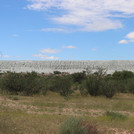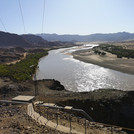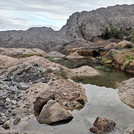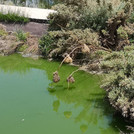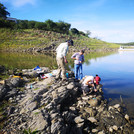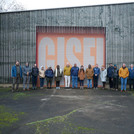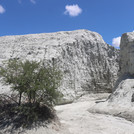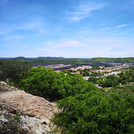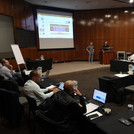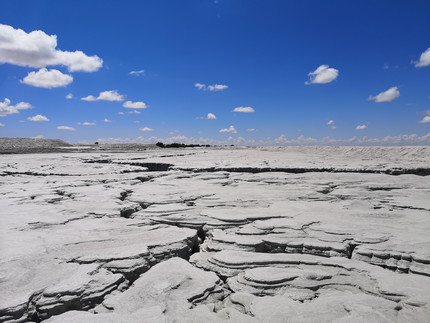WaMiNa - Sustainable and climate adapted Water Management in Mining of Namibia and neighbouring countries
Mining activities require large quantities of water for the extraction and processing of ores, for energy production or dust control, and for the management of post-mining landscapes. Many deeper mines also need to be dewatered on an ongoing basis and often after closure. The composition of mine wa-ters depends fundamentally on the particular production process, the geogenic background (host rock, ore type), and the chemicals used in mining and processing. Often, the resulting mine waters are acidic and/or contain toxic amounts of metals or other pollutants that can severely contaminate groundwa-ter and surface water and thus the surrounding environment. Even though in Namibia, as in South Africa, agriculture rather than mining is the main user of water, the potential risk is very high compared to other sectors. Ensuring a safe water supply is therefore a major challenge, especially for agricultural activities and the many settlements in southern Africa that have sprung up around mines. In addition, the importance of mine water and process water for irrigation purposes is steadily increasing, espe-cially in arid areas. Already today, due to the general water scarcity and regional differences, a wide variety of sectoral water use concepts for mines exist in southern Africa, both in terms of supply (e.g., through groundwater and surface water or seawater desalination), disposal or reuse of the water used and the mining infrastructure (e.g., water storage in abandoned mines), and the resulting environmen-tal risks and conflicts of interest. There is an urgent need for more advanced strategies for adapted mining water management, including across national borders, and for a secure year-round water sup-ply that follows an integrated approach, is adapted to local conditions, and takes into account the needs of other consumers and stakeholders as well as the consequences of climate change.
This 18-month definition project will seek to achieve the following key objectives:
- Establishment of a network of the participating universities for scientific exchange and the development of joint teaching programs for students and training course offerings for the min-ing sector.
- Establishment of a competence network for the development of concepts for sustainable and climate-adapted water management in mining in Namibia and neighboring countries (Mi-WaNet) through the participation of companies, administration and research institutions.
- Preparation of a report on best practices and lessons learned in the field of mine water man-agement in Namibia and Southern African countries. This report will be instrumental in devel-oping an optimized and targeted research program for the main project phase and avoiding redundancies.
- Conduct initial pilot studies and field campaigns on the contamination of irrigation water by mine water and on the water balance of phytoremediation during revitalization of post-mining landscapes.
- Identify the most significant challenges for sustainable and climate-adaptive mining water management and design a synergistic research program to ensure water quality and availabil-ity in the mining sector and affected neighboring sectors, such as agriculture, for the main phase of the MiWaNet funding program.
WaMiNa was funded by the German Ministry of Education and Research (BMBF) from 1.12.2021 till 31.5.2023. A follow-up project is submitted in June 2023 with the title: Sustainable and climate adapted Water Management in Mining of Southern African Region
Reports prepared during this project on the situation of mining in the Southern African Region are listed in the following link collection

